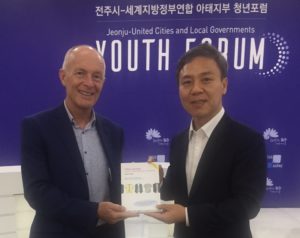David Parrish gave a speech in Jeonju, South Korea, about job creation for youth through the creative industries and social entrepreneurship.
He spoke about worldwide economic changes that mean there are fewer ‘jobs for life’. At the same time there are new opportunities for young people, and others. It has never been easier to set up a business in the creative industries or the social enterprise sector. It is easier than ever to trade internationally.
David spoke about how we can be creative not only in the studio but also in the office, giving examples of creative approaches to business that can be used in the creative industries and social enterprise sectors.
The full text of his speech is below.
At the conference, David presented a copy of his book ‘T-Shirts and Suits: A Guide to the Business of Creativity’ to the Mayor of Jeonju, Mr Kim Seung-Su.
David also presented a copy of his book to Bernadia Irawati Tjandradewi, the Secretary General of UCLG-ASPAC, the United Cities and Local Governments, Asia Pacific.
David’s book has been translated and published in 13 countries worldwide. At the conference there was some discussion about translating it for publication in South Korea.
Job Creation for Youth through Social Economy and Social Entrepreneurship
David Parrish
Jeonju, South Korea. 30 August 2018
Young people around the world are adapting to new economic realities more quickly than the institutions of government.
Young people are taking control of their futures by being more entrepreneurial and creating new jobs.
Our job is to help them!
Friends: It is an honour and a pleasure to be a part of this forum.
We have a lot to learn from each other and to share with each other.
I am looking forward to continuing this dialogue, both during the rest of today and in the future.
Working together, sharing our international experiences, we can achieve great things.
The nature of work is changing; there are fewer ‘jobs for life’ Economies around the world are changing profoundly. Here in Korea, in my own country (the United Kingdom), and globally. As economies change, so does the nature of work. There are fewer ‘jobs for life’ than there were in previous decades. Employment is less certain and people are more likely to change jobs during a lifetime, or make a career from a ‘portfolio’ of jobs. The ‘Gig Economy’ is growing as more people take on freelance work and become self employed. Whilst parents want their children to have safe and secure jobs, young people know that the world is now different for them. Around the world, young people know that they have to be versatile and agile in finding work. Compared to earlier generations, they are more comfortable with the idea of having a portfolio of part time jobs, hobbies, projects and enterprises. They are the new entrepreneurs.
Barriers to entry are low; it’s never been easier to start up
Whilst finding a lifelong job is becoming more difficult, the good news is that it has never been easier to become self employed or to set up a business. The internet makes it easier to trade globally. With a laptop and an internet connection, a young person can set up and run a business from their bedroom. Although the situation is different in every country, I think it is fair to say that setting up a small company is becoming easier for individual citizens, including of course young people. There are more opportunities than ever before to become an entrepreneur, not least in the creative industries and the social enterprise sector.
Micro businesses and Social Enterprises make a big economic impact
In my international experience of having worked around the world in many countries, I have found that governments, policy makers and economic development institutions tend to focus on creating jobs in the old fashioned way. Their policies and mindsets are more appropriate to the last century. They expect jobs to be created hundreds at a time, in factories and offices, but the reality is that jobs are being created by micro businesses, in twos and threes and fours. These are often regarded as insignificant by economic departments, yet thousands of jobs are being created by small businesses in this way. This phenomenon led me to write an article about the situation in Liverpool, England. I called it the ‘Invisible Sector’ of the economy, meaning the small businesses creating lots of jobs, yet not making the news, each of them too small to attract the attention of the media, politicians and bureaucrats, yet collectively having a huge impact on job creation and economic development.
Social Purpose + Smart Business Thinking = Social Entrepreneurship
Below the government’s radar, thousands of young people around the world are creating jobs for themselves by setting up small companies, especially creative businesses and social enterprises.
The motivation for setting up a social business is always a passion for a social purpose. This is necessary but not sufficient. To be successful in both social and economic terms, there needs to be another ingredient, which is ‘Smart Business Thinking’. My message to young entrepreneurs, in my books, my speeches, my training workshops and my website is that we should embrace business and use the techniques of business for our own purposes, according to our own values and objectives. There is sometimes a reluctance to engage with business methodology or even a suspicion of business. There is often a feeling that business is not cool, especially in the creative industries and the social enterprise sector. We mustn’t let business control us; we should instead be clear about our mission, our values and our definition of success. Then use the tools of business to achieve that success.
Smart Business Thinking, Creative Business Models and Good Practices
We can be creative about the way we do business. We don’t have to follow the traditional rules. We can be creative, not just in the studio, but also in the business office. Let me share with you, briefly, just a few examples of this creativity in business. These are just some of the creative business models I have seen work successfully, in my own enterprises or with the hundreds of businesses I have worked with around the world.
Co-opetition
In Vietnam, two competing art galleries in Ho Chi Minh City decided that they could co-operate with their rivals by joining forces to sell their art online on a joint website: Vietnam Artist. This combination of co-operation and competition can be called “Co-opetition”. Sometimes, in the right circumstances, even though it is counter intuitive, it can make sense to collaborate with competitors.
Organisational structures
Sometimes startup businesses come to me and ask my advice about what legal structure they should use to set up their social enterprise. Although legal formats differ from country to country, there are often several options. Often they ask their question assuming they can only choose one format, but sometimes my advice is to set up two different legal entities through which to undertake business. For example a non-profit enterprise plus a separate profit-making business. There are many opportunities for joint ventures, subsidiary companies, franchise arrangements, licensing deals, the use of networks of freelance contractors, etc.
In my book ’T-Shirts and Suits: A Guide to the Business of Creativity’ I also write about Network Organisations and even the Club Sandwich Organisation.
‘Freemium’ business models
The word ‘Freemium’ is a hybrid of two words: Free and Premium. Sometimes it makes sense to give something away in order to make more money indirectly. There are many examples of this in the commercial world. And it makes sense for social enterprises especially. We can serve the many for free and at the same time generate income from a smaller number of paying customers. Here’s an example: I choose to give away, free of charge, the eBook version of my book ‘T-Shirts and Suits: A Guide to the Business of Creativity’. Why? Am I stupid? No, because in doing that I achieve two things. Firstly, I share my knowledge about entrepreneurship with many thousands of people around the world who simply download the eBook from my website. That fulfils my social mission: to empower entrepreneurs. At the same time, the book acts as my advertising, showcasing my expertise in business, and my style of communication, so that paying customers come to me to buy business advice, training workshops, conference speeches and paperback books.
All three examples above show that we just have to use our creativity to think differently, to be innovative about business, to be smart.
More information plus Free Resources for Entrepreneurship:
There is a lot of information about creative and social entrepreneurship on my website, much of which is free to download, including my eBook, other publications, videos, online courses, articles and blog posts.
Please download them and share them.
Conclusion
In conclusion, the world is changing and young people are at the forefront of that change.
They are empowering themselves as entrepreneurs and in doing so creating new jobs.
We can choose to think in out of date ways about how jobs should be created.
Or we can choose to accept the new realities that young people already understand.
Let’s use the energy and enthusiasm of their youth; let’s help to empower young people; let’s use the momentum of their initiatives to create jobs in new ways.
I wish you every success in helping to create jobs for youth in the social economy through social entrepreneurship.


